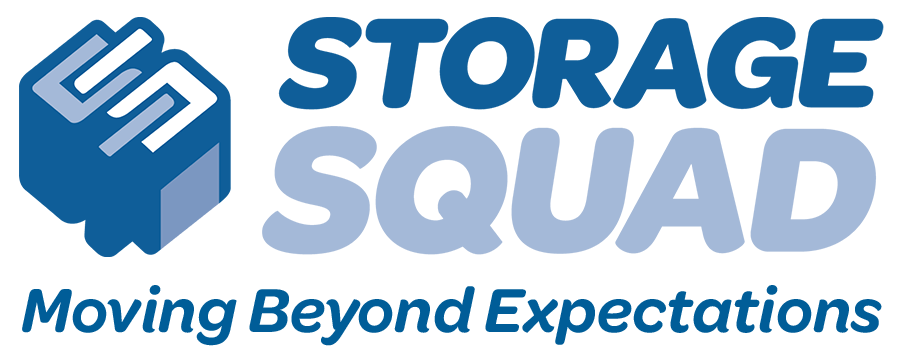Helping students Every Step of the Way!
March 2023
Needs have shifted. There is an increased demand for campus programs that provide support in the classroom and residence halls. In addition, students are looking for more help as they navigate the journey that begins with their first move-in to the last move-out, and housing professionals have shepherded this process for many years.
Post-COVID, one thing is for sure, housing professionals don’t want to be in the moving and storage business any longer. Therefore, the need for a qualified, trusted partner to help students with moving and storage is amplified. Storage Squad is here to help your team, campus, and ACUHO-I.
Storage Squad and ACUHO-I entered a partnership to help your campus meet the move-in and move-out needs of students, families, and your campus team. This agreement supports the ACUHO-I membership and participating colleges and universities through revenue-sharing models.
Andy McDade leads Storage Squad. He started his career at TCNJ, culminating as an ACUHO-I Parthenon Inductee in 2018. In the last 40 years, Andy has been a trusted partner to more than 1,000+ colleges and universities, connecting the needs of students, families, and campuses to meaningful services at crucial times of the student experience while helping individuals through his association with NACURH and campus organizations. We are thrilled to partner with him and the Storage Squad team to support the housing profession on campus and via ACUHO-I.
Storage Squad is the collegiate division of 1-800-PACK-RAT | Zippy Shell, a leading provider of portable storage and moving containers with numerous facilities across the USA. The Squad’s services are flexible, student-oriented, and designed to allow you to choose the method for pick-up and delivery and your comfort level of involvement. The focus is on facilitating student transition while easing congestion at move-in and move-out while easing the campus mailroom burden.
Summer storage is not a new concept, yet they have leveraged technology to streamline and simplify the process for students. For example, their Ship2School program allows students to ship items to the Squad’s local facility for “last mile” delivery direct to the student’s room. Additionally, every Squad team offers an intern program on campus that can provide your students with valuable experience and who know and respect campus rules and regulations.
I encourage you to learn more about how you can help your students, ease congestion on campus, reduce mailroom burden and support ACUHO-I by contacting Andy McDade at [email protected].
As always, thank you for all you do to support students and provide a supportive living and learning environment.
Sincerely,
Leon McClinton | ACUHO-I President
Mary DeNiro | ACUHO-I CEO
Spring. Break.
The two words that get every college student’s attention in the second semester.
In the middle of the semester students often find themselves tired and burnt out. The end of the semester seems so far away and their battery is running low. And that’s when Spring Break comes at the perfect time. The chance to relax and have a week full of endless possibilities causes everyone to be buzzing about their Spring Break plans when it’s approaching. Some people go off on trips to get a change of scenery while others go and seek the comforts of home.
For those looking forward to going back home to see their family and pets, being at home allows time to unwind and relax. The comforts of home helps recharge for the last part of the semester because it gives a chance to slow down from the weekly grind of classes and homework. Also, being at home gives time to reflect on how the semester and personal goals.
For others, going on trips they recharge by venturing out of their college bubble looking for fun. Some might go to the beach or some might hit the mountains for a ski trip. These experiences create great memories for lots of people that they will always look back on. These trips help people to recharge by being around the people they care about without having to worry about any of the worries from school.
Regardless of what one chooses to do during Spring Break it is important to allow oneself to rest and recharge so that they can finish strong!
February 2023
Often times college students try to avoid early classes, but waking up early will help lead to a more productive lifestyle.
No one looks forward to hearing their alarm go off, which causes lots of us to hit snooze once, twice, or way too many times than we should. Then we realize we are late and have to rush out the door to get to class. Despite having to leave the comfort of our beds, waking up early and creating a routine can lead to significant changes in our lives.
3 tips on how to become a morning person:
1. Create a consistent sleep schedule.
Going to bed and waking up at the same time helps our bodies to get into a schedule which helps us to be more alert when we wake up. Also, make sure you are getting enough sleep as most people need six to eight hours of sleep.
2. Have all your things packed up and ready for the morning.
Having your bag packed and your clothes picked out help you to make less decisions in the morning so you can be more efficient and arrive early.
3. Give yourself plenty of time in the morning.
Start your mornings off at a relaxed pace and creating time for yourself and your mental health can help improve your attitude. Simply taking five minutes to meditate or pray and allow yourself to not worry about anything can put you in a great mood to tackle the day. For those feeling ambitious you can even use the extra time in the mornings to get a workout in.
Just taking these simple steps and waking up early will make your life more productive and organized. The results will leave you more time to hang out with friends and to pursue the things you enjoy. All it takes is starting healthy habits and not hitting snooze!
January 2023
Starting a new semester is always exciting, but it can also be overwhelming. New classes, new friends, and new opportunities also means new responsibilities, obligations and commitments—it’s a lot to figure out all at once.
Everyone wants to have it all, the social and academic balance, but it can be difficult to manage once you’re already in the thick of it. If week 1 didn’t go your way, that’s completely okay! Pause, remember what your goals were and hit that reset button!
Here are some tips on how to start your semester strong.
1. Make Goals
Set goals for what you want to achieve this semester beforehand so you can the most out of your time on campus. Start by setting big picture goals and then break them down into smaller and more achievable tasks, this will keep you focused and help you to not get overwhelmed this semester.
2. Have a Schedule (and stick with it!)
An established routine is key to success. Structure in your daily life will make things more manageable so that you have time to get everything done than you need to achieve for that week. Making time in advance for school, friends, extracurriculars or whatever your goals are will help you to keep up when the semester gets busy.
3. Use Your Resources
It is important to utilize your academic and career resources to get the maximum benefits out of your campus. Make sure you take advantage of your academic advisors, office hours and other campus resources like tutoring to help you succeed.
4. Get Involved Early
College isn’t just about classes; it is important to become a part of your campus community in groups that help you feel supported and to spend time doing things you like. This can look like joining a cultural or religious club or signing up for intramural sports – get involved!
5. Update Your Resume
It is important to keep your resume updated, especially if you are planning on applying for jobs on campus or internships. Updating it before the summer ends makes any upcoming opportunities easier to tackle!
6. Take Care of Yourself
Finally, and most importantly, don’t forgot to take care of yourself. You will have so many amazing opportunities and responsibilities this upcoming semester, don’t forget to give yourself time to breathe. Take breaks, exercise, and make time for yourself.
And remember, college is not only about academics. Have fun and stay healthy, you are only here for a short time so make the most out of it!
The start of the New Year marks an exciting time for everyone. Whether you’re a believer in goals or resolutions, most people are hopeful of what the new year may bring. However bold we might be coming out of the holiday season into the fresh unknown, it can certainly be hard to follow through on those goals.
Studies as of 2016 show that only 9 percent of Americans who set New Year’s resolutions feel that they achieve them. Out of the Americans who set resolutions, a disproportionate number have given up within the first month or even weeks of the New Year. For college students, this can be even more difficult once classes start up and free time begins to dissipate. If that’s the case, it’s likely that a great number of us (myself included) have already given up their resolutions?
Essential tips to restart your New Year’s Resolutions:
1. Narrow the focus on your most important goals
If you’re anything like me, I aimed far and wide in 2023. Surely, since self-improvement goals all have a positive impact, the more the merrier, right? Unfortunately, this isn’t typically the case. The more goals you have, the less likely you are able to follow through. It may make sense to reevaluate your goals for this year in light of what you’ve found to be more critical to your personal fulfillment and development.
2. Re-define your goal
After starting a new goal, you may find that the target was a little off. That’s not to say that one month represents your full year potential! However, some of our initial goals may not be realistic given our history or current situation. For example, if you aimed to workout 6 times per week this year but find it won’t be possible with your course-load, it may make sense to aim for 4 or 5 times per week. There is no shame in altering your goals to be more achievable.
3. Break down your goal for the next month
If you’ve had trouble maintaining focus on a year-long goal, it may be better to set more short-term goals. These goals may ultimately point toward a long-term goal, and are often easier to maintain. If you’re hoping to become a morning person in 2023, it will be a lot easier to set a goal of waking up 30 minutes earlier in February than you did in January, and so on. This can be much less scary than jumping straight into the deep end of the pool!
4. Give yourself a little grace
It can be easy to go hard on yourself after you feel like you fell flat on your New Year’s resolutions. At the same time, remember that it’s meant to be a positive impact, and you may not always succeed. If you mess up on a goal or underperform one week, that doesn’t mean you need to wait until next year to start over. To remain persistent in your goals, remember to give yourself grace when you slip up. You can’t change who you are overnight, but you can certainly get 1% better each day.
Regardless if you are still pursuing or restarting a resolution this New Year, I hope these tips are an encouragement! Best of luck to all students in their spring semester and broader goals.



